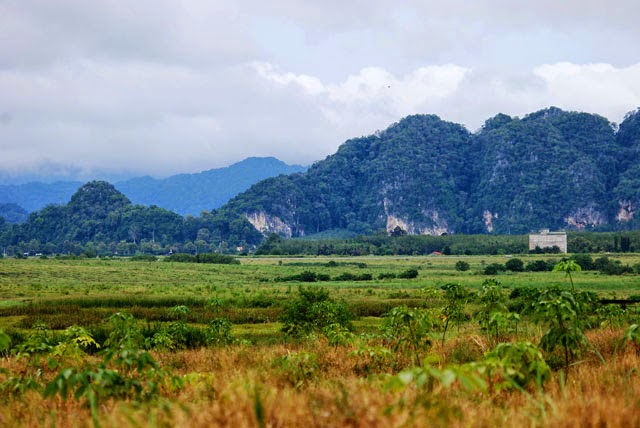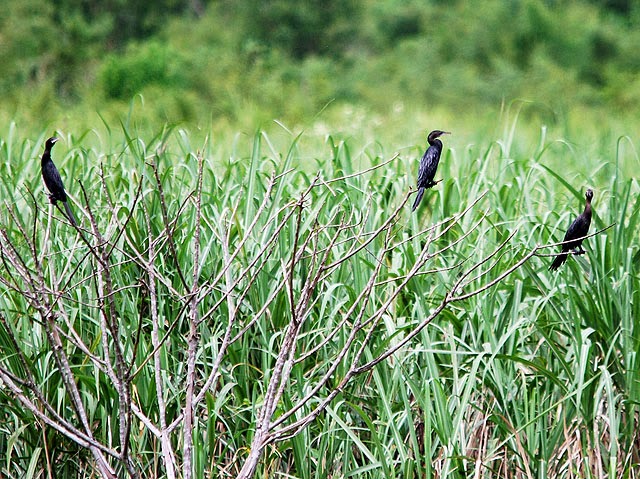Chuping
is known for its extensive sugarcane plantation and sugar refinery. It is also
a sweet spot for birders as it provided a number of rarities including five
first records for Peninsula Malaysia. However, the entire area is gradually
being converted into rubber plantation. Once the sugarcane plantations and open
grassland habitats disappear, so will the rarities and the rest of the
migratory birds that find sanctuary here. It was raining when Hor Kee and I
left Penang and in most parts of our car journey through the states of Kedah
and Perlis. Chuping being the hottest place in Peninsula Malaysia,
managed to keep the rain out but not the rain clouds.
Raptors
are one of the star attractions here and luckily, the overcast sky did not stop
them from going about their business today. The first raptors to catch our
attention were these Oriental Honey-buzzards undertaking their autumn migration
south. This raptor is undoubtedly one of the most varied in terms of plumages
and I usually rely on its body shape with its characteristic smallish head for
identification. I will not even go near sexing and aging the birds. I am a
simple man and I like to keep things simple. We counted only 15 birds which is
a small number compared to the spectacle of hundreds that migrate over certain
areas elsewhere in the peninsula.
Harriers
winter here in good numbers which makes Chuping one of the best places to
observe these graceful raptors. We were fortunate enough to witness a mid-air
squabble between two young Eastern Marsh Harriers. The identification of
harriers can be confusing at times and these two were confirmed by Dave and
Chaiyan after the trip. The individual being chased was second year subadult
male and his pursuer was a first year juvenile.
Unlike
most raptors, the difference in the gender of adult harriers is very apparent
and the males, I must add, are truly beautiful. This male Eastern Marsh Harrier
is a fine example and he performed well for a couple of visiting birders today.
His
buoyant flight and strikingly marked plumage set against the limestone outcrops
is my definition of poetry in motion. This being the first time I was able to
photograph an adult male this close made the encounter even more memorable.
The
Little Cormorant is a rare migrant to Peninsula Malaysia but for the past few
seasons, it has been recorded more regularly. I have had two previous
encounters with this species before but this is the first I managed to
photograph it. There were at least five present at this pond today but none of them
were close enough for any really good images. But I love cormorants and I guess
a detour to this spot on my next visit is inevitable.
An
adult Purple Heron eyeing our vehicle suspiciously as we drove past it along
the maze-like network of dirt roads that cut through the plantation. Due to the
lack of landmarks and the sheer size of the plantation, you can easily lose
yourself here. Apart from the occasional plantation worker or birder, this
place is virtually deserted. I have to be thankful my companions have a better
sense of direction than me. Otherwise, we will be looking for a way out more
than looking for vagrants at this birding locality.
There
were quite a number of Zitting Cisticolas present this time and I cannot really
recall if this grassland species was this abundant here in the past.
Red-wattled
Lapwings tend to give away their presence due to their extremely vocal nature.
Their loud calls are usually heard before you actually see the bird. This time
it was a juvenile giving out the alarm calls.
It
has become sort of a ritual to scrutinize every Paddyfield Pipit that one comes
across in Chuping for an off-chance that it could turned out to be the much
rarer Blyth's or Richard's Pipit. And to be totally honest, I will still most
probably overlook the rarities because to me, the three of them look almost
identical.
No
rare passerines were encountered today. In fact, things nearly came to a stand
still once it was midday. This young Brown Shrike provided little compensation
for the lack of noteworthy birds.
Is
the reign of Chuping as the most exciting birding spot in Peninsula Malaysia
coming to an end? Have the rubber plantations caused too much damage to the
habitat and driving away the birds? Questions like these pondered our minds as
we slowly made our way back home through strong winds and heavy downpour.
Hopefully, another visit later in the month will be able to put our worries to
rest and produce a couple more first records for Peninsula Malaysia.





















4 comments:
Guess the rare ones have yet to descent on our shores. Better luck in your next visit!
Thanks, Ronnie. I'm keeping my fingers crossed!
Really nice photos of the harriers! A lot of raptors are passing through northern Thailand at the moment too.
Thank you, Ayuwat. It must be pretty exciting for you now.
Post a Comment